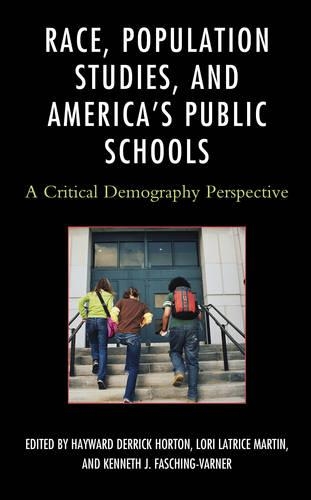
Race, Population Studies, and America's Public Schools: A Critical Demography Perspective
(Hardback)
Publishing Details
Race, Population Studies, and America's Public Schools: A Critical Demography Perspective
By (Author) Hayward Derrick Horton
Edited by Lori Latrice Martin
Edited by Kenneth J. Fasching-Varner
Contributions by Alice T. Crowe
Contributions by Trish Davis
Contributions by Latrisha Y. Dean
Contributions by Kenneth J. Fasching-Varner
Contributions by Hayward Derrick Horton
Contributions by Kimberly R. James
Contributions by Derrick Lathan
Bloomsbury Publishing PLC
Lexington Books
8th December 2016
United States
Classifications
Professional and Scholarly
Non Fiction
Educational strategies and policy
Population and demography
370.973
Physical Properties
Hardback
156
Width 159mm, Height 239mm, Spine 17mm
426g
Description
The roles of race and racism in explaining current controversies related to public schools in America is both understudied and misunderstood. Part of the problem is the absence of a critical paradigm that facilitates the development and application of ideas, theories, and methods that do not fit within the confines of mainstream scholarship. Race, Population Studies, and America's Public Schools: A Critical Demography Perspective explores the paradigm of critical demographyestablished in the late 1990s which articulates the manner in which the social structure differentiates dominant and subordinate populations. Moreover, critical demography necessitates explicit discussions and examinations of the nature of power and how it perpetuates the existing social order. Hence, in the case of race in education, it is imperative that racism is central to the analysis. Racism elucidates that which often goes ignored or unexplained by conventional scholars. Consequently, the critical demography paradigm fills an important void in the study of public education in American schools.
Reviews
Race, Population Studies, and Americas Public Schools rips the mask off reams of traditional scholarship with its objective pose and its conceit of colorblind beneficence, illuminating the shrouded realities of oppression, power, and privilege lurking just beneath. And it comes at a perfect time: the centuries-old Black Freedom Movement is once again erupting, a fourth American revolution brewing. Read, study, learn, and rise up. -- Bill Ayers, emeritus, University of Illinois at Chicago
This is a refreshing collection highlighting the importance of a long-standing paradigm using many empowering examples. Strongly recommended. -- Teresa A. Booker, John Jay College of Criminal Justice
Author Bio
Hayward Derrick Horton is professor of sociology at University at Albany, State University of New York. Lori Latrice Martin is associate professor of sociology and African and African American studies at Louisiana State University. Kenneth J. Fasching-Varner is Shirley B. Barton Endowed associate professor at Louisiana State University.
